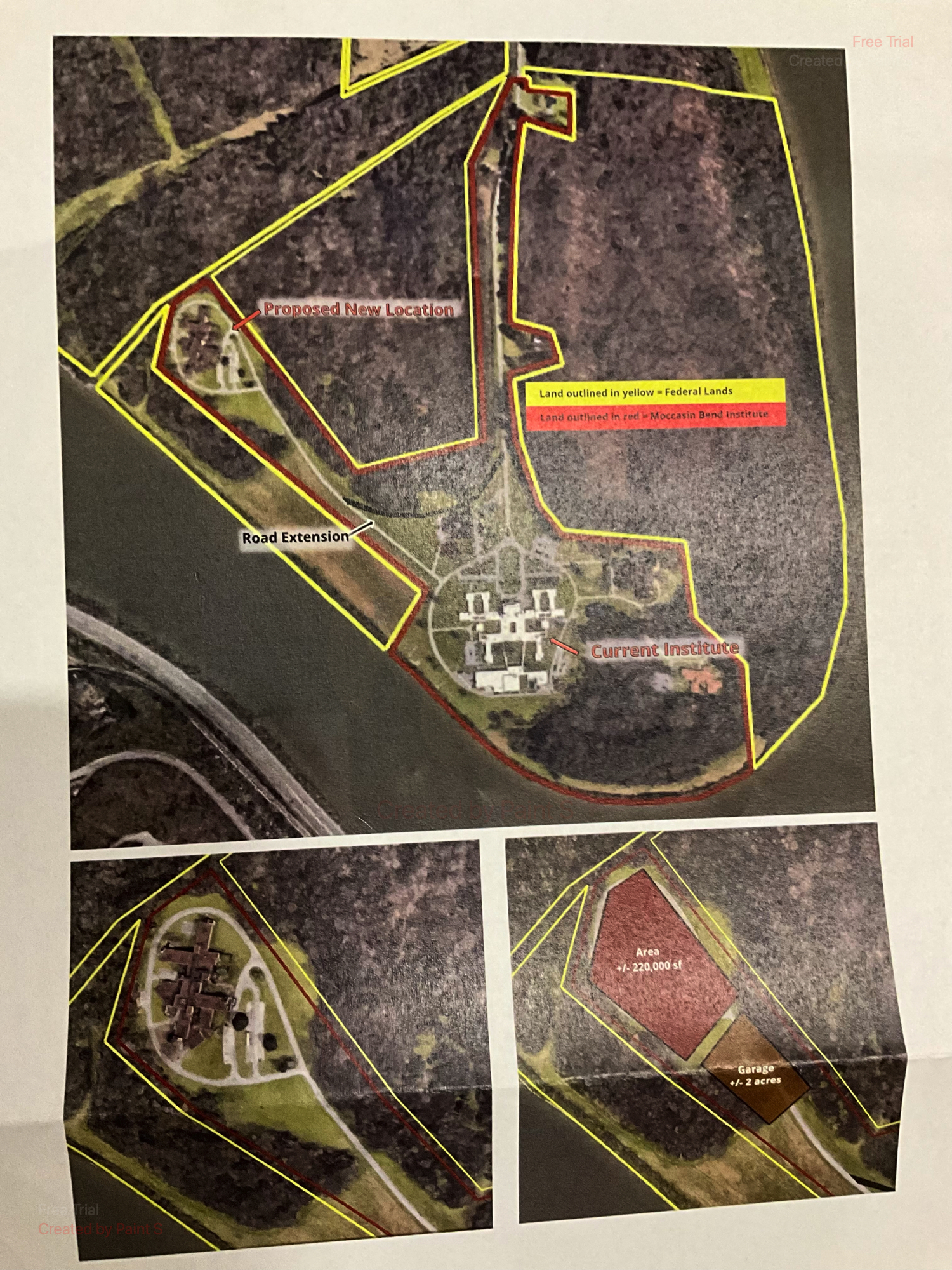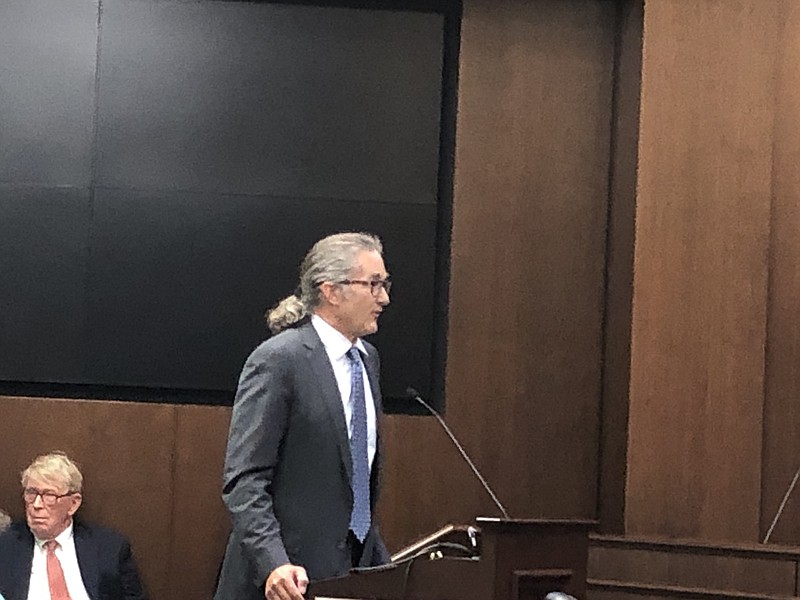NASHVILLE — Tennessee State Building Commission members Thursday gave the go-ahead for the Lee administration to proceed with planning a $260 million project to replace the existing psychiatric hospital on Chattanooga's history-rich Moccasin Bend with a new facility.
But in a move that surprised opponents of the proposed Moccasin Bend Mental Institute replacement now worried about potential damage to Native American artifacts, state Mental Health and Substance Abuse Commissioner Marie Williams announced during her presentation the state will first have an archeological survey done on the site, which is within the Moccasin Bend National Archeological District.
"We will conduct an archeological exploratory survey prior to any final decision on this site," Williams told commission members. "If the survey is acceptable, then we will proceed with the razing of the Winston Building and construct the replacement hospital and parking garage on that site."
(READ MORE: State proposes rebuild of Moccasin Bend Mental Health Institute)
The district is a unit of the National Park Service. Native American sites, a historic road trace used during the Cherokee removal and a collection of Civil War earthworks have all been found in the area. Chattanooga Mayor Tim Kelly and others have advocated for the hospital to be relocated to an area off Moccasin Bend, with much of the discussion about building a new psychiatric facility on the Erlanger Health campus.
Earlier, Frank "Mickey" Robbins, of Chattanooga, a member of the National Park Partners organization and a former chair of the Moccasin Bend Mental Health Institute board, told commission members that while pleased with the state's commitment of funding for a new hospital, his primary concern is there is no public transportation for patients and families who need it as well as Moccasin Bend being serviced with only a two-lane road for emergency and other vehicles and facing what could be a "stream" of National Park visitors.
"Verbal commitments" were made to the National Park Service during the 2001 congressional process when creating the archeological district as well as to Native American tribes that any continuance of nonconforming land use would revert to the district, Robbins added.
The new hospital would be on 13 acres of state property where the hospital's now-empty Winston Building is located, and utility work could likely disturb "culturally sensitive land, ancient Native American villages," Robbins said. Also, the Lyndhurst Foundation and the Benwood Foundation have jointly expressed support for a two-year "intensive look" at site selection, Robbins told commissioners.
Read more: Chattanooga Conservationists, health advocates' questions
In response to questions about other nonconforming installations on Moccasin Bend, Tricia King Mims, executive director of National Park Partners and a former executive director of the Friends of Chickamauga and Chattanooga National Military Park, said Chattanooga and Hamilton County governments had agreed to move a police firing range on Moccasin Bend to an Amnicola Highway site owned by TVA and are in negotiations for a long-term lease agreement of the site.
"Right now, it's really just a question of finalizing a lease agreement," she said in response to questions posed by House Speaker Cameron Sexton, R-Crossville, who is a commission member.
Karen Stone, also with National Park Partners, said she has been involved with the Friends of Moccasin Bend organization and the archeological district for 23 years. "We all agree" that a new state-of-the-art behavioral complex is much needed and "very important" for the East Tennessee region, she said.
But if it remains on Moccasin Bend, the state could become embroiled in a "no-win confrontation" over religious matters with Native American tribes, she said.
 Tennessee Department of General Services / This aerial photo shows the current Moccasin Bend Mental Health Institute hospital at lower left. The proposed location of a replacement hospital at the old Winston Building is toward the upper left. The stand-alone photo at bottom left is of the Winston Building. The photo at bottom right includes space for a proposed parking garage.
Tennessee Department of General Services / This aerial photo shows the current Moccasin Bend Mental Health Institute hospital at lower left. The proposed location of a replacement hospital at the old Winston Building is toward the upper left. The stand-alone photo at bottom left is of the Winston Building. The photo at bottom right includes space for a proposed parking garage."Protests and lawsuits might delay construction and be a very costly fight," Stone said, going on to note Native Americans now have the resources and the "will to fight or sue."
Speaking in favor of keeping the institute on Moccasin Bend was Cathy Saint George, a registered nurse who moved to the area for its beauty and now works at the psychiatric facility.
Saint George said the atmosphere has a beneficial effect on patients, describing it as a "calming, therapeutic environment."
Williams, the mental health and substance abuse commissioner, later said in an interview outside the meeting room that advocates' suggestion that an alternative could be built beside Erlanger Health won't work in her view.
"No sir, not at all. I've been reading in the paper about Erlanger," she said. "The square footage and the ability to have any kind of space for longer-term clients is just not present. I mean, the ability to have outside space for people to be able to have recreation, be able to be outside. It's just not present."
Moreover, the cost for building a new psychiatric facility at Erlanger would be nearly $31 million more than what the state is looking at with the Moccasin Bend site, Williams said.
John Hull, deputy commissioner with the Department of General Services, told the Chattanooga Times Free Press the archeological assessment is nothing new.
"It's normal for us as one of the first steps on any projects, and, obviously, we would do that here," Hull said. "The kickoff today is from the Building Commission approving the project to allow us to actually get started on this. So that's the first thing we'll do.
Both state Senate Finance Committee Chair Bo Watson, R-Hixson, and House Finance Chair Patsy Hazlewood, R-Signal Mountain, who've worked extensively with other Hamilton County lawmakers and the state, were at Thursday's meeting.
"Obviously Chairman Hazlewood and I are very both interested in making sure we protect Moccasin Bend," Watson said following the meeting. "But it's the balance that was discussed in the meeting today. And so we'll move forward with the archeological examination and see what it tells us. I think it is important to note that we are not proposing a new space. We are proposing to tear down a building that is currently there, the Winston Building, and build that facility on that footprint. So it's not like we're going out into new space."
Hazlewood has been spearheading the delegation's effort.
"This is where we are today based on the facts we have today," Hazlewood said. "This approval that we got in there just now, now we can gather more facts. ... Those facts may change the circumstances. We don't know until we do" proceed.
The current facility would be razed if the Winston Building solution works and that property would become part of the archeological district, Williams said.
The ideal solution would be for the hospital to be moved elsewhere, but officials also want to make sure there is a facility that serves patients best, and this is the best solution, Hazlewood said.
Watson also noted there remains a government-operated golf course on Moccasin Bend as well.
Former Chattanooga Mayor Ron Littlefield, who also spoke at the commission, later said his recollection is that the golf course could be closed to become part of the archeological park. Others speaking included Jay Mills, who is also one of the directors for National Park Partners for Chickamauga, Chattanooga and Moccasin Bend.
The archeological survey will help determine how to move forward with "whatever's found on that land," Williams said.
"I can't tell you if it will change anything," she said. "We're going to take it each step at a time but really do our best to respond to the current situation there."
Contact Andy Sher at asher@timesfreepress.com or 615-285-9480.
